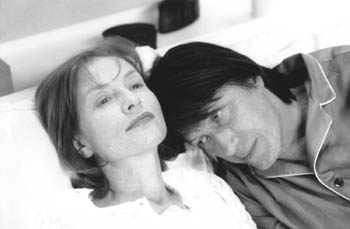![[Metroactive Movies]](/gifs/movies468.gif)
[ Movies Index | Show Times | North Bay | Metroactive Home | Archives ]
Separated at Birth
'Merci Pour le Chocolat' will make you nice and drowsy
By Richard von Busack
Sometimes a civilized entertainment is just too civilized. When that occurs, you can guess that Isabelle Huppert wasn't far from the scene. Merci Pour le Chocolat is Claude Chabrol's latest. And in the lead--playing another stiff-backed, polite murderess--we have Isabelle Huppert, late of The Piano Teacher, demonstrating almost expressionist levels of repression. I know that sounds like a contradiction in terms, but it isn't so easy to describe the performance of an actress whose characters are so high-strung you practically hear a vibrato when they walk.
Huppert plays a chocolate heiress named Marie-Claire "Mika" Muller. She lives in Lausanne, Switzerland, with her husband, André Polonski (Jacques Dutronc), a noted pianist. His son from a previous marriage is Guillaume (Rodolphe Pauly). The parents understand that the boy, without ambition or apparent talent, is a disappointment.
Into this correct but not unhappy menage arrives a young woman, a piano student named Jeanne (Anna Mouglalis) who is possessed by an odd idea: she'd heard from her mother that there was possibly a mix-up of babies at the hospital and now believes André might be her real father.
André intuits that there's merit in Jeanne's idea. In her playing, he hears a reflection of his own talent, as clearly as he can see her in the reflection in the highly polished lid of his grand piano. Together, the two practice Liszt's Funeral March, an unusual composition that starts with bass notes tolling like bells and ends in such an ornate series of chords that you temporarily forget that the grave is the goal.
This new friendship disturbs Mika, and she shows her jealousy like Huppert always does, by thinning out her already frosty smile of welcome. Perhaps Jeanne wouldn't have intruded on Huppert's household if she knew Mika might be capable of murder. And Guillaume may have grounds for moping.
Just as Hamlet had an uncle who was a stepfather, he himself has an aunt who is a stepmother. Mika inherited Guillaume from her dead sister who perished in an unfortunate automobile accident, having somehow got barbiturates in her bloodstream. Mika's ritual of offering hot chocolate at night to her guests makes it clear how she might have done the trick.
Merci Pour le Chocolat has its good points, especially the flashback where we see the night of the mother's death, with the bile-colored light puddling around Huppert. Chabrol also gets a frisson out of the way spilled chocolate looks like spilled blood. And Mika spends her free moments crocheting an uncuddly-looking Afghan from brown yarn. When spread around her, it's the shape of a spider web.
The film is based on the novel The Chocolate Web by Charlotte Armstrong. Armstrong was a vintage mystery novelist whose book Mischief was the source for Marilyn Monroe's B-picture Don't Bother to Knock. She also wrote the basis for 1947's The Unsuspected, a film noir with Claude Rains as a true-crime host forced to solve a murder he committed.
Merci Pour le Chocolat does seem like a similarly elegant late-show refugee. But in old age, Chabrol is applying himself to abrade the viewer's nerves as gently as possible, like a cabinetmaker applying the finest sandpaper. Unfortunately, this opus is so well-bred it's hard to stay awake for it. The way Chabrol directs here, he seems to have been imbibing from Mika's barbiturate-laden aperitifs.
[ North Bay | Metroactive Central | Archives ]
Copyright © Metro Publishing Inc. Maintained by Boulevards New Media.
![]()

Sweet Tooth: Isabelle Huppert and Jacques Dutronc mull over the aphrodisiac effects of chocolate.
'Merci Pour le Chocolat' opens at the Rafael Film Center, Friday, Oct. 18. See Movie Times, p26, for showtimes.
From the October 17-23, 2002 issue of the North Bay Bohemian.